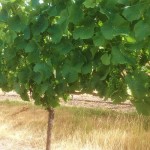A little about why we pluck leaves from the vines

– it reduces disease pressure, particularly the incidence of powdery mildew and botrytis, due to the increase in airflow and reduction in humidity as well as an increase in UV levels. The open canopy also allows for more effective disease prevention activities e.g. application of sprays.
– the effects of increased light and temperature also increase tannin levels in the berry skins which help them survive disease attacks but also add structure to the Pinot Noir wine.
– this temperature/light benefit also results in increased rates of malic acid degradation which is an important step towards ripeness and also reduces levels of green unripe flavours from compounds such as methoxypyrazine.
All of these things allow us to let the fruit ripen for as long as we think is necessary and that the level of ripeness is uniform through all the fruit rather than a mix of under and over ripe fruit. Visually being able to see the fruit easily as we walk down the rows also makes it much easier to monitor the fruit and also speeds up our hand-harvesting.
Whilst this may seem like a straight forward operation it is important to not overdo it and important that it’s done soon after fruit set in order to avoid sunburnt grapes. Generally it will be carried out more on the shaded side of the canopy. The best result is achieved if the work is done by hand which allows for the variations in canopy density and row orientation to be taken into account. It also minimises any physical damage that might result from machinery bruising the fruit.
It is not the most exciting job in the vineyard so it is also important that the work is closely monitored to avoid over or under achieving!
(Olly Masters – Winemaker & Michelle Dacombe- Vineyard Manager)
